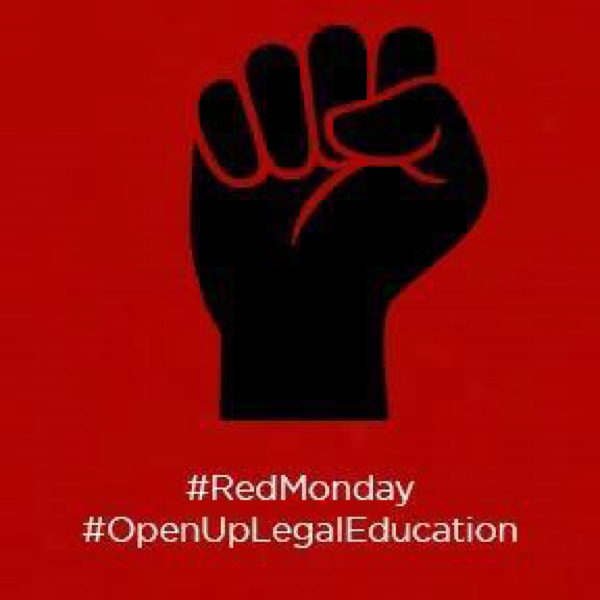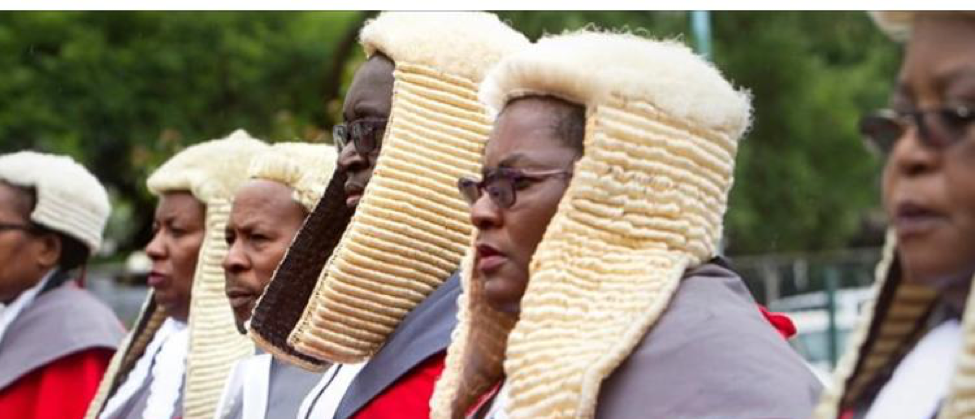
Of Opening Up Legal Education In Ghana
“If people want to do their own law practice, they can go on the internet. Members of the public can go on the internet and turn themselves into lawyers if they want to.”
If you’re wondering, that’s Justice Sophia Akuffo, Chief Justice of the Republic of Ghana. The same Chief Justice who reintroduced the wearing of wigs, arguing that it will “preserve the tradition and uniqueness of the work of judges.” And who described the work of a professor — who had done an extensive research into the political coloration of Supreme Court judgments in ‘political cases’ — as unfortunate, foreign and dangerous, stressing that “when you’re putting it out, maybe you need to add a little salt, as the Bible says, to what you have presented. Because our society and the environment is completely different from the American one which has developed its own systems. We have never had this kind of thing. But when it receives the imprimatur of a professor it becomes dangerous.”
The irony was lost on her. But don’t let that fool you. The Chief Justice is a foremost jurist, having served on the bench for many years. However, her rise to fame — even among lawyers — didn’t come at the back of delivering a landmark judgment. Rather, she’s famous for her one-woman crusade to restrict the number of lawyers in Ghana.
Addressing an assembly of lawyers and judges, the judicial juggernaut made this promise: “Those of you lawyers and those of you lecturers who are busy advocating free scale, mass admissions into the Professional Law Course and mass production of lawyers, be careful what you wish for. So long as I have anything to do with it, it won’t happen!”
Being the Chairperson of the General Legal Council, the body mandated to regulate legal education, and thus having something to do with it, this was a promise she had every intention of keeping.
Out of the 1820 students who sat for the entrance exam for entry into the Ghana School of Law this year, only 128 supposedly passed. The General Legal Council (GLC) has since insisted that there’s no conspiracy to admit fewer students as they had made plans to admit up to a thousand students. The students simply failed!
What exactly did they fail?
The Law School Entrance Exam is a two-hour paper that is based on about ten law courses. One of the requirements for taking the test is the completion of an LL.B. Which means that you’re only eligible if you have passed all the ten courses that the entrance exam seeks to test. So why the exam? Well, that’s a good question!
The entrance exam was introduced as recently as 2012. Before then, people who finished their LL.B simply walked into the Ghana Law School. I had a lecturer who usually joked about how authorities from the Ghana Law School would come to the Faculty of Law in Legon (now UGSoL) to plead with them to attend lectures. But, of course, that was when Legon was the only law faculty.
While the number of law faculties grew by leaps and bounds, the GLC made no attempt to expand the Ghana School of Law or find creative ways of giving access to the growing number of LL.B holders. Instead, they introduced the entrance exam as a means to restrict entry. (It’s always been about limited space). So that a 100% pass rate defeats the purpose of the exam. That’s why students who’re more than qualified are denied access every year.
I say more than qualified because when the Ghana Law School started, you didn’t need an LL.B to enroll. Indeed, it’s not uncommon to become a lawyer without a law degree. Taking the California bar exam, for example, doesn’t necessarily require a law degree. Our President, Nana Akufo-Addo, and the former Speaker of Parliament, Bamford Addo, are examples of qualified legal professionals (lawyer and judge respectively) without law degrees.
However, due to limited space and lack of creative inspiration, the GLC has preferred a two-hour test, as a more comprehensive metric of assessing competence, to LL.B degrees from accredited faculties.
This reeks of incompetence and an absence of leadership. Perhaps, that explains the GLC’s defensive posture whenever the issue is brought up. Their attitude is comparable to the proverbial ostrich that buries its head under the sand and believes that the rest of its body is hidden. The GLC believes that by insisting that only a few students are qualified to take the Professional Law Course, their glaring lack of thinking will not be exposed. But it’s clear that, like the proverbial ostrich, it’s only the GLC that cannot see that their behind is hanging high.
The AG’s Department appears to have a more sympathetic posture, never mind that the AG is a member of the GLC and is legally mandated to direct same as she deems fit. But her office is as sympathetic as it is reluctant, even powerless.
All fingers seem to point to the judicial King Kong, the CJ, who claims that “Law is not a noble profession, it is the noble profession.” Perhaps, too noble for the many qualified LL.B holders.
The failed class of 2019.
I can’t speak for other schools but it was all smiles at the UGSol graduation. For the first time since the inception of the school, it was graduating 5 first-class students. The Guest Speaker was astounded. “ I must say that I’m truly impressed. Because I know how hard it is to get a first-class from the faculty. During my time, I was the best graduating student but I didn’t graduate with a first-class.” That was Kimathi Kuenyehia, who was so impressed as to give out 500 dollars each to all the 5 first-class students.
I still remember the beaming smile on the face of the best graduating student as he made his way to the podium of the Great Hall to deliver his valedictory speech, amidst applause and chants from his colleagues who knew how big of a deal it was. I also recall the closing remarks of the Chancellor of the University, the hope in her voice as she wished us luck and said she didn’t doubt that we’ll ace the exam.
The day of the exam came. I remember how we had told ourselves that we’d not discuss the questions after the paper, and how in the end the paper had been too good to not talk about. We knew each other and we knew the test we’d just taken. So that we kept joking that GLC better make more room. I was standing by the car of a friend when a senior colleague said, with a big smile on his face, “ they’ll have to raise the pass mark to 70!”. I thought that was profound. Because he wasn’t oblivious of the fact that it was an elimination test and that we were competing for space. Failing that test was far from our minds. Because guess what? The pass mark was 50. Instead, our minds were on the numbers: 450 in 2016, 500 in 2017 and 465 in 2018. It was a matter of hoping to be in the top 400-ish.
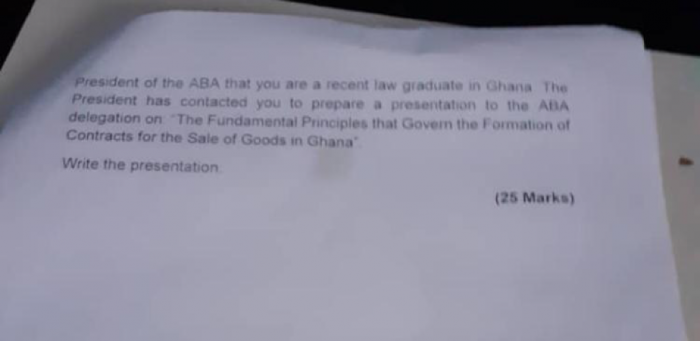
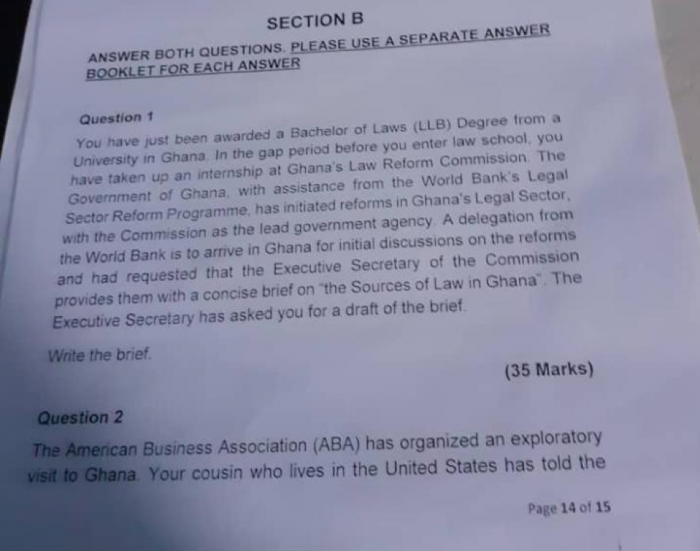
93% of law graduates failed this test?
Racing through the I.D numbers came so fast. Followed by the quick second glance with an accelerated heartbeat. Is that all? That was the question everyone kept asking. We had read reports in which the GLC had expressed worry over lack of space because the main campus couldn’t accommodate two academic year groups. Had they not thought about this before they rushed to return the school to two years? Our questions were many.
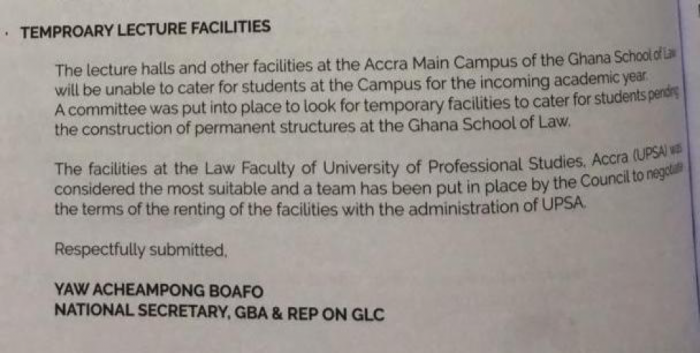
But the GLC responded swiftly with the publication of the raw scores of the exam, which revealed that only 128 people managed to score above 50. And 93% failed, with marks ranging from 49.5 to 0. Yes, zero! Some people had scored zero on a test of 20 multiple-choice questions and 2 essays. And, yes, these people had graduated with LL.Bs from accredited institutions. The answer was simply this: “We had space, but the students failed!”

It was shocking. GLC had everyone questioning themselves. Initial reactions were to find out who and who was on the magic list.
Out of the 5 first-class students from Legon, only one was on the list. Countless names of some of the very top graduating students were nowhere to be found, including the best graduating student. It soon became apparent that an overwhelming majority of us didn’t get in. So we started looking outside. Maybe the fault was with Legon. But we’d find out with utter dismay that out of over 200 students from KNUST, about 9 made it. Many more shocking revelations followed. The best graduating student from GIMPA — a bright young woman who completed Mfantsiman with 7 As, graduated from UCC with a first-class in BCOM and had finished GIMPA with a GPA of 3.84 — didn’t make the list. The Best graduating student from UCC graduated with an impressive GPA of 3.96. She, too, didn’t make it. Many more stories have been told of some of our country’s brightest who have now become statistics in news headlines: 93% LAW SCHOOL MASS FAILURE.
It’s curious, though, that the only test they failed disqualified them from taking the Professional Law Course. Nothing else mattered. Two hours was all it took for GLC to dash their dreams, hopes, and aspirations. Because they reserve the right to give you any mark. And, yes, you can’t challenge it. You’re not eligible to take the test unless you sign an undertaking giving up your right to challenge the results. If this is not the biggest scam since the devil told Eve she could be God, then I don’t know what is. So, to the failed class of 2019: Keep your heads up, because you’re in a damn good company!
Way forward?
“The General Legal Council is abusing the trust that the nation has reposed in them…and it was time they were told, in plain language, that they should stop the nonsense. Because what they are doing is nonsensical. I can’t understand. As a former director of the Ghana Law School, I’ve got to say it as it is: what they are doing is unbecoming and it was time they stopped…what they are trying to do is just perpetrating fraud on unsuspecting students.” — Kwaku Ansa-Asare. Fmr. Director of Legal Education, Ghana School of Law.
“ Each year sees approximately 2/3 of the exiting cohort added to the backlog. It is not satisfactory, it is not sustainable…We have noted that graduate legal education is now unfortunately and shamefully being subordinated to its counterpart professional legal education — Ebow Bondzi Simpson. Rector of GIMPA and Founding Dean of GIMPA Law School.
“I completely disagree with the Chief Justice’s position. That’s extreme conservatism. Because we all know the deficit that we have in this country concerning the legal profession. There’s a crying need for us to have certified practitioners in various areas of our country. I think that the CJ got it wrong. I will support the establishment of more schools of law…I will support the education of more lawyers in this country…The police are called in to prosecute because of a lack of lawyers.” — Alban Bagbin. Legal Practitioner and Fmr. Majority Leader of Parliament.
“ I was listening to the CJ, I think she is too conservative. As the economy expands you will need the legal dimension to it. I think we must open our minds. The philosophy the Chief Justice is pushing forward is not going to help this country — an expanding modern society. Something is wrong with the system; it is a systemic failure and we’re refusing to understand it.” — Kwaku Baako Jnr. Editor-in-Chief of the New Crusading Guide.
“ A similar dysfunctional system would have failed 95% of us; I mean it would have failed 95% of all the lawyers and judges in Ghana. Let’s not pretend standards have fallen and that the students are dummies; they are not.” Poku Adusei. Lawyer and Lecturer at UGSoL.
“ …I fail to see why we are afraid to give the opportunity to study or the opportunity to sit the bar exam to many. Is it because of fear that they will pass?” —Clara Beeri Kasser-Tee. Private Legal practitioner and Lecturer at GIMPA Law School.
Evidently, notable members of the society agree that there’s the need for a complete overhaul of the current system. The growing consensus seems to be that GLC should be content with its role as a regulator and should step aside from running a law school. If it so desperately wishes to run a law school, there’s no justification for why it should run the only law school. Many faculties have the competence to run the courses that are taught at the law school. LL.B holders may even choose to self-tutor. The GLC can then ensure quality by simply setting a comprehensive bar exam for those who wish to be called. This idea that anyone who wants access to professional education wants to be called to the bar is not in keeping with modern trends of the profession. In any case, admission into the Ghana Law School does not make a person a lawyer. It only gives access to professional education and an opportunity to take the bar. How then is the fear of producing sub-par lawyers reconcilable with denying people access to professional legal education?
An entrance exam is not a worthy obstacle in the way of law graduates. As a regulator, the GLC could ensure that accredited law faculties are providing the best legal training. With that guaranteed, all LL.B holders from these institutions would automatically qualify to take the Professional Law Course, bringing us back to why the entrance exam was instituted in the first place. It’s the ultimate catch-22.
There’s overwhelming evidence that the only way forward is to #OpenUpLegalEducation and #ReformLegalEducationNow.
